Deck 3: Introduction to the Derivative
Question
Question
Question
Question
Question
Question
Question
Question
Question
Question
Match between columns
Question
Question
Question
Question
Question
Question
Question
Question
Question
Question
Question
Question
Question
Question
Question
Question
Question
Question
Question
Question
Question
Question
Question
Question
Question
Question
Question
Question
Question
Question
Question
Question
Question
Question
Question
Question
Question
Question
Question
Question
Question
Question
Question
Question
Question
Question
Question
Question
Question
Question
Question
Question
Question
Question
Question
Question
Question
Question
Question
Question
Question
Question
Question
Question
Question
Question
Question
Question
Question
Question

Unlock Deck
Sign up to unlock the cards in this deck!
Unlock Deck
Unlock Deck
1/140
Play
Full screen (f)
Deck 3: Introduction to the Derivative
1
Estimate the limit numerically. 
A)
B)
C)
D)
E)

A)

B)

C)

D)

E)


2
Use the graph to compute  .
. 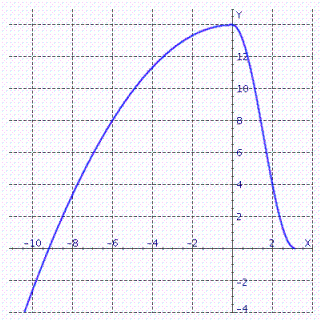
 .
. 
8
3
Compute  .
. 
A)
B)
C)
D)
E)
 .
. 
A)

B)

C)

D)

E)


4
Estimate the limit numerically. 
A)
B)
C)
D)
E)

A)

B)

C)

D)

E)


Unlock Deck
Unlock for access to all 140 flashcards in this deck.
Unlock Deck
k this deck
5
Estimate the limit numerically. 
A)
B)
C)
D)
E)

A)

B)

C)

D)

E)


Unlock Deck
Unlock for access to all 140 flashcards in this deck.
Unlock Deck
k this deck
6
Estimate the limit numerically. 
A)
B)
C)
D)
E)

A)

B)

C)

D)

E)


Unlock Deck
Unlock for access to all 140 flashcards in this deck.
Unlock Deck
k this deck
7
Use the graph to compute 
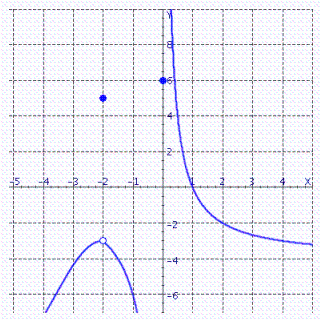
A)
B)
C)
D)
E)does not exist


A)

B)

C)

D)

E)does not exist

Unlock Deck
Unlock for access to all 140 flashcards in this deck.
Unlock Deck
k this deck
8
Estimate the limit numerically. 
A)
B)
C)
D)
E)

A)

B)

C)

D)

E)


Unlock Deck
Unlock for access to all 140 flashcards in this deck.
Unlock Deck
k this deck
9
Estimate the limit numerically. 
A)
B)
C)
D)
E)

A)

B)

C)

D)

E)


Unlock Deck
Unlock for access to all 140 flashcards in this deck.
Unlock Deck
k this deck
10
Match between columns

Unlock Deck
Unlock for access to all 140 flashcards in this deck.
Unlock Deck
k this deck
11
The number of visitors, in millions of visitors per year, to Hawaii in the years 1985 to 1993 can be approximated by  where t = 0 represents June 30,1985. During the same period, visitor spending can be approximated by
where t = 0 represents June 30,1985. During the same period, visitor spending can be approximated by  where t = 0 represents June 30,1985.Assuming the trends in the models above continue indefinitely, numerically estimate
where t = 0 represents June 30,1985.Assuming the trends in the models above continue indefinitely, numerically estimate  . Please round the answers to the nearest hundredth.
. Please round the answers to the nearest hundredth.
A)
B)
C)
D)
E)does not exist
 where t = 0 represents June 30,1985. During the same period, visitor spending can be approximated by
where t = 0 represents June 30,1985. During the same period, visitor spending can be approximated by  where t = 0 represents June 30,1985.Assuming the trends in the models above continue indefinitely, numerically estimate
where t = 0 represents June 30,1985.Assuming the trends in the models above continue indefinitely, numerically estimate  . Please round the answers to the nearest hundredth.
. Please round the answers to the nearest hundredth.A)

B)

C)

D)

E)does not exist

Unlock Deck
Unlock for access to all 140 flashcards in this deck.
Unlock Deck
k this deck
12
Use the graph to compute 
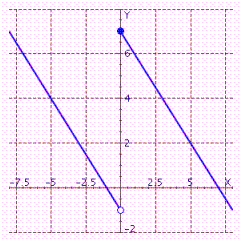
A)
B)
C)
D)
E)does not exist


A)

B)

C)

D)

E)does not exist

Unlock Deck
Unlock for access to all 140 flashcards in this deck.
Unlock Deck
k this deck
13
Use the graph to compute the given quantity. 
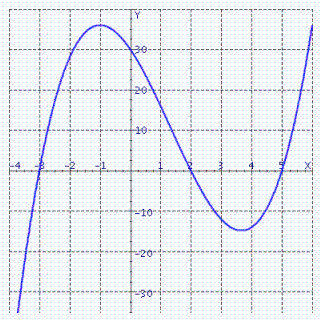
A)
B)
C)
D)
E)


A)

B)

C)

D)

E)


Unlock Deck
Unlock for access to all 140 flashcards in this deck.
Unlock Deck
k this deck
14
Estimate the limit numerically. 
A)
B)
C)
D)
E)

A)

B)

C)

D)

E)


Unlock Deck
Unlock for access to all 140 flashcards in this deck.
Unlock Deck
k this deck
15
Estimate the limit numerically. 
A)-2
B)
C)
D)
E)

A)-2
B)

C)

D)

E)


Unlock Deck
Unlock for access to all 140 flashcards in this deck.
Unlock Deck
k this deck
16
Estimate the limit numerically. 
A)
B)
C)
D)1
E)

A)

B)

C)

D)1
E)


Unlock Deck
Unlock for access to all 140 flashcards in this deck.
Unlock Deck
k this deck
17
Use the graph to compute the following quantities. 
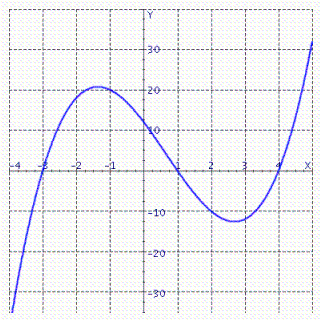 Please enter your answer as two numbers, separated by a comma.
Please enter your answer as two numbers, separated by a comma.

 Please enter your answer as two numbers, separated by a comma.
Please enter your answer as two numbers, separated by a comma.
Unlock Deck
Unlock for access to all 140 flashcards in this deck.
Unlock Deck
k this deck
18
Use the graph to compute 
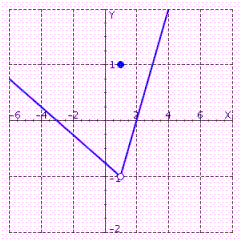
A)
B)
C)
D)
E)does not exist


A)

B)

C)

D)

E)does not exist

Unlock Deck
Unlock for access to all 140 flashcards in this deck.
Unlock Deck
k this deck
19
Estimate the limit numerically. 
A)
B)
C)
D)
E)

A)

B)

C)

D)

E)


Unlock Deck
Unlock for access to all 140 flashcards in this deck.
Unlock Deck
k this deck
20
If  is the Dow Jones Average at time
is the Dow Jones Average at time  and
and  , is it possible that the Dow will fluctuate indefinitely into the future?
, is it possible that the Dow will fluctuate indefinitely into the future?
A)yes
B)no
 is the Dow Jones Average at time
is the Dow Jones Average at time  and
and  , is it possible that the Dow will fluctuate indefinitely into the future?
, is it possible that the Dow will fluctuate indefinitely into the future?A)yes
B)no

Unlock Deck
Unlock for access to all 140 flashcards in this deck.
Unlock Deck
k this deck
21
The graph of a function  is given. Determine whether
is given. Determine whether  is continuous on its domain.
is continuous on its domain. 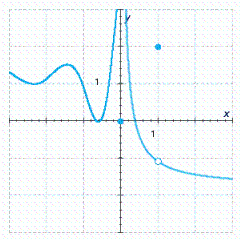
A)Continuous
B)Discontinuous
 is given. Determine whether
is given. Determine whether  is continuous on its domain.
is continuous on its domain. 
A)Continuous
B)Discontinuous

Unlock Deck
Unlock for access to all 140 flashcards in this deck.
Unlock Deck
k this deck
22
Determine what, if any, value to assign to f ( a )to make f continuous at x = a .  ;
; 
A)
B)
C)
D)
E)No value of f (0)will make it continuous at .
.
 ;
; 
A)

B)

C)

D)

E)No value of f (0)will make it continuous at
 .
.
Unlock Deck
Unlock for access to all 140 flashcards in this deck.
Unlock Deck
k this deck
23
Determine what, if any, value to assign to f ( a )to make f continuous at x = a .  ;
; 
A)
B)
C)
D)
E)No value of will make it continuous at
will make it continuous at  .
.
 ;
; 
A)

B)

C)

D)

E)No value of
 will make it continuous at
will make it continuous at  .
.
Unlock Deck
Unlock for access to all 140 flashcards in this deck.
Unlock Deck
k this deck
24
Use a graph of f or some other method to determine what, if any, value to assign to f ( a )to make f continuous at x = a . 
A)
B)
C)
D)
E)No value of will make it continuous at
will make it continuous at  .
.

A)

B)

C)

D)

E)No value of
 will make it continuous at
will make it continuous at  .
.
Unlock Deck
Unlock for access to all 140 flashcards in this deck.
Unlock Deck
k this deck
25
The graph of a function  is given. Determine whether
is given. Determine whether  is continuous on its domain.
is continuous on its domain. 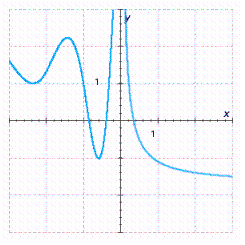
A)Continuous
B)Discontinuous
 is given. Determine whether
is given. Determine whether  is continuous on its domain.
is continuous on its domain. 
A)Continuous
B)Discontinuous

Unlock Deck
Unlock for access to all 140 flashcards in this deck.
Unlock Deck
k this deck
26
Use a graph to determine whether the function is continuous on its domain. If it is not continuous on its domain, list the points of discontinuity. 
A)The points of discontinuity: -2, 0.
B)The point of discontinuity: 0.
C)The function is continuous on its domain.
D)The point of discontinuity: 2.
E)The points of discontinuity: 2, 0.

A)The points of discontinuity: -2, 0.
B)The point of discontinuity: 0.
C)The function is continuous on its domain.
D)The point of discontinuity: 2.
E)The points of discontinuity: 2, 0.

Unlock Deck
Unlock for access to all 140 flashcards in this deck.
Unlock Deck
k this deck
27
Use a graph to determine whether the given function is continuous on its domain. If it is not continuous on its domain, list the points of discontinuity. 
A)The point of discontinuity: .
.
B)The points of discontinuity: .
.
C)The function is continuous on its domain.
D)The point of discontinuity: .
.
E)The points of discontinuity: -2, 0.

A)The point of discontinuity:
 .
.B)The points of discontinuity:
 .
.C)The function is continuous on its domain.
D)The point of discontinuity:
 .
.E)The points of discontinuity: -2, 0.

Unlock Deck
Unlock for access to all 140 flashcards in this deck.
Unlock Deck
k this deck
28
Use a graph to determine whether the given function is continuous on its domain. If it is not continuous on its domain, list the points of discontinuity. 
A)The points of discontinuity: .
.
B)The point of discontinuity: .
.
C)The points of discontinuity: .
.
D)The point of discontinuity: .
.
E)The function is continuous on its domain.

A)The points of discontinuity:
 .
.B)The point of discontinuity:
 .
.C)The points of discontinuity:
 .
.D)The point of discontinuity:
 .
.E)The function is continuous on its domain.

Unlock Deck
Unlock for access to all 140 flashcards in this deck.
Unlock Deck
k this deck
29
Determine what, if any, value to assign to f ( a )to make f continuous at x = a .  ;
; 
 ;
; 

Unlock Deck
Unlock for access to all 140 flashcards in this deck.
Unlock Deck
k this deck
30
The graph of a function  is given. Determine whether
is given. Determine whether  is continuous on its domain.
is continuous on its domain. 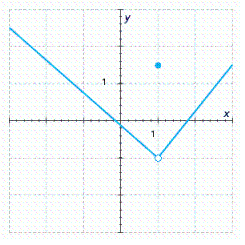
A)Discontinuous
B)Continuous
 is given. Determine whether
is given. Determine whether  is continuous on its domain.
is continuous on its domain. 
A)Discontinuous
B)Continuous

Unlock Deck
Unlock for access to all 140 flashcards in this deck.
Unlock Deck
k this deck
31
Determine what, if any, value to assign to f ( a )to make f continuous at x = a .  ;
; 
A)
B)
C)
D)
E)No value of f (0)will make it continuous at 0.
 ;
; 
A)

B)

C)

D)

E)No value of f (0)will make it continuous at 0.

Unlock Deck
Unlock for access to all 140 flashcards in this deck.
Unlock Deck
k this deck
32
Use a graph to determine whether the function is continuous on its domain. If it is not continuous on its domain, list the points of discontinuity. 


Unlock Deck
Unlock for access to all 140 flashcards in this deck.
Unlock Deck
k this deck
33
The graph of a function  is given. Determine whether
is given. Determine whether  is continuous on its domain.
is continuous on its domain. 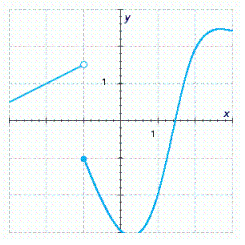
A)Continuous
B)Discontinuous
 is given. Determine whether
is given. Determine whether  is continuous on its domain.
is continuous on its domain. 
A)Continuous
B)Discontinuous

Unlock Deck
Unlock for access to all 140 flashcards in this deck.
Unlock Deck
k this deck
34
The graph of a function  is given. Determine whether
is given. Determine whether  is continuous on its domain.
is continuous on its domain. 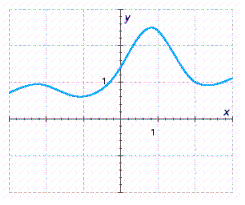
A)Discontinuous
B)Continuous
 is given. Determine whether
is given. Determine whether  is continuous on its domain.
is continuous on its domain. 
A)Discontinuous
B)Continuous

Unlock Deck
Unlock for access to all 140 flashcards in this deck.
Unlock Deck
k this deck
35
Use a graph to determine whether the given function is continuous on its domain. If it is not continuous on its domain, list the points of discontinuity. 
A)The function is continuous on its domain.
B)The point of discontinuity: .
.
C)The point of discontinuity: .
.
D)The points of discontinuity: .
.
E)The points of discontinuity: .
.

A)The function is continuous on its domain.
B)The point of discontinuity:
 .
.C)The point of discontinuity:
 .
.D)The points of discontinuity:
 .
.E)The points of discontinuity:
 .
.
Unlock Deck
Unlock for access to all 140 flashcards in this deck.
Unlock Deck
k this deck
36
Determine what, if any, value to assign to f ( a )to make f continuous at x = a .  ;
; 
 ;
; 

Unlock Deck
Unlock for access to all 140 flashcards in this deck.
Unlock Deck
k this deck
37
Draw the graph of a function that is continuous on its domain but not continuous at any integer.
A)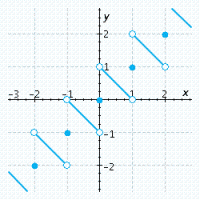
B)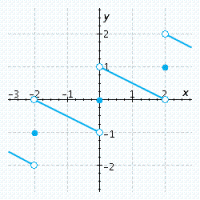
C)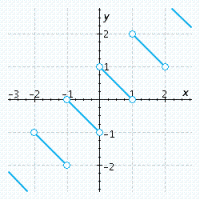
D)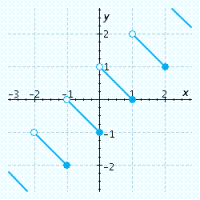
E)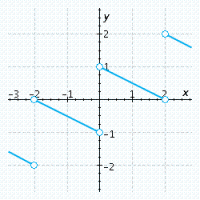
A)

B)

C)

D)

E)


Unlock Deck
Unlock for access to all 140 flashcards in this deck.
Unlock Deck
k this deck
38
Compute the derivative function  algebraically.
algebraically. 
 algebraically.
algebraically. 

Unlock Deck
Unlock for access to all 140 flashcards in this deck.
Unlock Deck
k this deck
39
The graph of a function  is given. Determine whether
is given. Determine whether  is continuous on its domain.
is continuous on its domain. 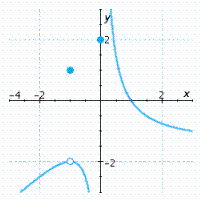
A)Discontinuous
B)Continuous
 is given. Determine whether
is given. Determine whether  is continuous on its domain.
is continuous on its domain. 
A)Discontinuous
B)Continuous

Unlock Deck
Unlock for access to all 140 flashcards in this deck.
Unlock Deck
k this deck
40
Use a graph to determine whether the function is continuous on its domain. If it is not continuous on its domain, list the points of discontinuity. 


Unlock Deck
Unlock for access to all 140 flashcards in this deck.
Unlock Deck
k this deck
41
Calculate the limit algebraically. 
A)37
B)36
C)-36
D)108
E)144

A)37
B)36
C)-36
D)108
E)144

Unlock Deck
Unlock for access to all 140 flashcards in this deck.
Unlock Deck
k this deck
42
Calculate the limit algebraically. 
A)11
B)1.2
C)-5
D)2.2
E)6

A)11
B)1.2
C)-5
D)2.2
E)6

Unlock Deck
Unlock for access to all 140 flashcards in this deck.
Unlock Deck
k this deck
43
Calculate the limit algebraically. 
A)-0.25
B)2
C)0.3
D)-4.0
E)None of these

A)-0.25
B)2
C)0.3
D)-4.0
E)None of these

Unlock Deck
Unlock for access to all 140 flashcards in this deck.
Unlock Deck
k this deck
44
Calculate the limit algebraically. 
A)
B)
C)
D)
E)

A)

B)

C)

D)

E)


Unlock Deck
Unlock for access to all 140 flashcards in this deck.
Unlock Deck
k this deck
45
Calculate the limit algebraically. 
A)-17
B)-8.5
C)8
D)4
E)3

A)-17
B)-8.5
C)8
D)4
E)3

Unlock Deck
Unlock for access to all 140 flashcards in this deck.
Unlock Deck
k this deck
46
Calculate the limit algebraically. 
A)-2.75
B)-0.75
C)-3
D)2.75
E)12

A)-2.75
B)-0.75
C)-3
D)2.75
E)12

Unlock Deck
Unlock for access to all 140 flashcards in this deck.
Unlock Deck
k this deck
47
Calculate the limit algebraically. 
A)9
B)-9
C)5
D)4
E)2.25

A)9
B)-9
C)5
D)4
E)2.25

Unlock Deck
Unlock for access to all 140 flashcards in this deck.
Unlock Deck
k this deck
48
Give an example of a function that is not continuous at  but is not discontinuous there either.
but is not discontinuous there either.
 but is not discontinuous there either.
but is not discontinuous there either.
Unlock Deck
Unlock for access to all 140 flashcards in this deck.
Unlock Deck
k this deck
49
Calculate the limit algebraically. 


Unlock Deck
Unlock for access to all 140 flashcards in this deck.
Unlock Deck
k this deck
50
Calculate the limit algebraically. 
A)
B)
C)0
D)
E)

A)

B)

C)0
D)

E)


Unlock Deck
Unlock for access to all 140 flashcards in this deck.
Unlock Deck
k this deck
51
Calculate the limit algebraically. 
A)
B)
C)
D)
E)

A)

B)

C)

D)

E)


Unlock Deck
Unlock for access to all 140 flashcards in this deck.
Unlock Deck
k this deck
52
Calculate the limit algebraically. 
A)1
B)2
C)-1
D)0.5
E)-2

A)1
B)2
C)-1
D)0.5
E)-2

Unlock Deck
Unlock for access to all 140 flashcards in this deck.
Unlock Deck
k this deck
53
Calculate the limit algebraically. 
A)6
B)-2
C)0
D)8
E)10

A)6
B)-2
C)0
D)8
E)10

Unlock Deck
Unlock for access to all 140 flashcards in this deck.
Unlock Deck
k this deck
54
Calculate the limit algebraically. 
A)25
B)50
C)5
D)-5
E)30

A)25
B)50
C)5
D)-5
E)30

Unlock Deck
Unlock for access to all 140 flashcards in this deck.
Unlock Deck
k this deck
55
Does this limit exist?  Select the correct answer.
Select the correct answer.
A)does not exist
B)exists
 Select the correct answer.
Select the correct answer.A)does not exist
B)exists

Unlock Deck
Unlock for access to all 140 flashcards in this deck.
Unlock Deck
k this deck
56
Calculate the limit algebraically. 
A)
B)
C)
D)
E)

A)

B)

C)

D)

E)


Unlock Deck
Unlock for access to all 140 flashcards in this deck.
Unlock Deck
k this deck
57
Find all points of discontinuity of the function. 
A)
B)
C) ,
,  ,
, 
D) ,
, 
E)The function is continuous everywhere.

A)

B)

C)
 ,
,  ,
, 
D)
 ,
, 
E)The function is continuous everywhere.

Unlock Deck
Unlock for access to all 140 flashcards in this deck.
Unlock Deck
k this deck
58
Calculate the limit algebraically. 
A)
B)
C)
D)
E)

A)

B)

C)

D)

E)


Unlock Deck
Unlock for access to all 140 flashcards in this deck.
Unlock Deck
k this deck
59
Find all points of discontinuity of the function. 
A) ,
,  ,
, 
B)
C) ,
, 
D)
E)The function is continuous everywhere.

A)
 ,
,  ,
, 
B)

C)
 ,
, 
D)

E)The function is continuous everywhere.

Unlock Deck
Unlock for access to all 140 flashcards in this deck.
Unlock Deck
k this deck
60
The cost of fighting crime in the U.S. increased steadily in the period 1982-1999. Total spending on police, courts, and prisons can be approximated, respectively, by  billion dollars
billion dollars 
 billion dollars
billion dollars 
 billion dollars
billion dollars  where t is time in years since 1980. Compute
where t is time in years since 1980. Compute  to two decimal places.
to two decimal places.
A)0.27
B)0.52
C)0.42
D)0.37
E)0.32
 billion dollars
billion dollars 
 billion dollars
billion dollars 
 billion dollars
billion dollars  where t is time in years since 1980. Compute
where t is time in years since 1980. Compute  to two decimal places.
to two decimal places.A)0.27
B)0.52
C)0.42
D)0.37
E)0.32

Unlock Deck
Unlock for access to all 140 flashcards in this deck.
Unlock Deck
k this deck
61
Calculate the limit algebraically. 


Unlock Deck
Unlock for access to all 140 flashcards in this deck.
Unlock Deck
k this deck
62
Calculate the average rate of change of the given function (Inflation (%)of Budget deficit (% of GNP))over the interval  .
. 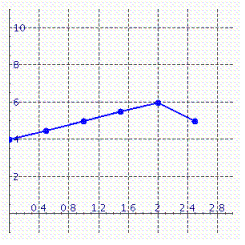
A)5
B)1
C)8
D)-0.5
E)-20
 .
. 
A)5
B)1
C)8
D)-0.5
E)-20

Unlock Deck
Unlock for access to all 140 flashcards in this deck.
Unlock Deck
k this deck
63
Calculate the average rate of change of the given function over the interval  .
. 
A)-10
B)-4
C)1.5
D)5
E)-5
 .
. 
A)-10
B)-4
C)1.5
D)5
E)-5

Unlock Deck
Unlock for access to all 140 flashcards in this deck.
Unlock Deck
k this deck
64
Calculate the average rate of change of the given function over the intervals  , where h = 1, 0.1, 0.01, 0.001, and 0.0001. (It will be easier to do this if you first simplify the difference quotient ( dq )as much as possible.)
, where h = 1, 0.1, 0.01, 0.001, and 0.0001. (It will be easier to do this if you first simplify the difference quotient ( dq )as much as possible.)  Complete the table.
Complete the table. 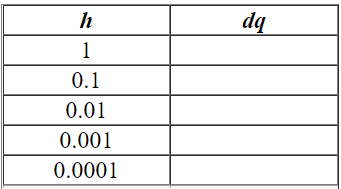
A)dq -6.4 -64 -640 -6,400 -64,000
B)dq 8.1 65.61 641.601 6,401.6001 64,001.60001
C)dq 1.7 1.61 1.601 1.6001 0
D)dq 1.7 1.61 1.601 1.6001 55,998.40001
E)dq 1.7 1.61 1.601 1.6001 1.60001
 , where h = 1, 0.1, 0.01, 0.001, and 0.0001. (It will be easier to do this if you first simplify the difference quotient ( dq )as much as possible.)
, where h = 1, 0.1, 0.01, 0.001, and 0.0001. (It will be easier to do this if you first simplify the difference quotient ( dq )as much as possible.)  Complete the table.
Complete the table. 
A)dq -6.4 -64 -640 -6,400 -64,000
B)dq 8.1 65.61 641.601 6,401.6001 64,001.60001
C)dq 1.7 1.61 1.601 1.6001 0
D)dq 1.7 1.61 1.601 1.6001 55,998.40001
E)dq 1.7 1.61 1.601 1.6001 1.60001

Unlock Deck
Unlock for access to all 140 flashcards in this deck.
Unlock Deck
k this deck
65
Calculate the average rate of change of the given function over the intervals  , where h = 1, 0.1, 0.01, 0.001, and 0.0001. (It will be easier to do this if you first simplify the difference quotient ( dq )as much as possible.)
, where h = 1, 0.1, 0.01, 0.001, and 0.0001. (It will be easier to do this if you first simplify the difference quotient ( dq )as much as possible.)  Complete the table.
Complete the table. 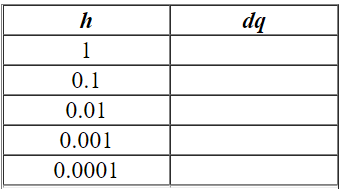
A)dq -0.3000 -0.3529 0.0000 0.0000 -0.3600
B)dq 1.5000 17.6471 179.6407 1,799.6401 17,999.6400
C)dq -0.3000 -0.3529 -0.3593 -0.3599 0.0000
D)dq -1.8000 -18.0000 -180.0000 -1,800.0000 -18,000.0000
E)dq -0.3000 -0.3529 -0.3593 -0.3599 -0.3600
 , where h = 1, 0.1, 0.01, 0.001, and 0.0001. (It will be easier to do this if you first simplify the difference quotient ( dq )as much as possible.)
, where h = 1, 0.1, 0.01, 0.001, and 0.0001. (It will be easier to do this if you first simplify the difference quotient ( dq )as much as possible.)  Complete the table.
Complete the table. 
A)dq -0.3000 -0.3529 0.0000 0.0000 -0.3600
B)dq 1.5000 17.6471 179.6407 1,799.6401 17,999.6400
C)dq -0.3000 -0.3529 -0.3593 -0.3599 0.0000
D)dq -1.8000 -18.0000 -180.0000 -1,800.0000 -18,000.0000
E)dq -0.3000 -0.3529 -0.3593 -0.3599 -0.3600

Unlock Deck
Unlock for access to all 140 flashcards in this deck.
Unlock Deck
k this deck
66
Calculate the average rate of change of the given function over the interval  .
. 
A)1.9
B)5.4
C)1.4
D)-10.8
E)5.3
 .
. 
A)1.9
B)5.4
C)1.4
D)-10.8
E)5.3

Unlock Deck
Unlock for access to all 140 flashcards in this deck.
Unlock Deck
k this deck
67
Calculate the average rate of change of the given function over the interval  .
. 
A)19
B)15
C)9
D)11
E)7
 .
. 
A)19
B)15
C)9
D)11
E)7

Unlock Deck
Unlock for access to all 140 flashcards in this deck.
Unlock Deck
k this deck
68
Calculate the average rate of change of the given function over the interval  . x 3 4 5 6 f ( x )5 15 4 9
. x 3 4 5 6 f ( x )5 15 4 9
 . x 3 4 5 6 f ( x )5 15 4 9
. x 3 4 5 6 f ( x )5 15 4 9
Unlock Deck
Unlock for access to all 140 flashcards in this deck.
Unlock Deck
k this deck
69
Calculate the average rate of change of the given function f over the intervals  , where h = 5, 0.5, 0.05, 0.005, and 0.0005. (It will be easier to do this if you first simplify the difference quotient ( dq )as much as possible.)
, where h = 5, 0.5, 0.05, 0.005, and 0.0005. (It will be easier to do this if you first simplify the difference quotient ( dq )as much as possible.)  Complete the table.
Complete the table. 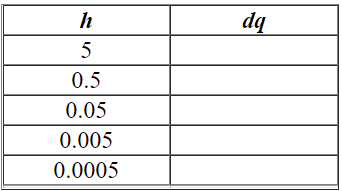
A)dq 145.6 569.5 -644 -6,404 496,071.0025
B)dq 96 73.5 -9 71.025 71.0025
C)dq -49.6 -496 -4,960 -49,600 -496,000
D)dq 96 73.5 71.25 71.025 71.0025
E)dq 96 297 71.25 71.025 71.0025
 , where h = 5, 0.5, 0.05, 0.005, and 0.0005. (It will be easier to do this if you first simplify the difference quotient ( dq )as much as possible.)
, where h = 5, 0.5, 0.05, 0.005, and 0.0005. (It will be easier to do this if you first simplify the difference quotient ( dq )as much as possible.)  Complete the table.
Complete the table. 
A)dq 145.6 569.5 -644 -6,404 496,071.0025
B)dq 96 73.5 -9 71.025 71.0025
C)dq -49.6 -496 -4,960 -49,600 -496,000
D)dq 96 73.5 71.25 71.025 71.0025
E)dq 96 297 71.25 71.025 71.0025

Unlock Deck
Unlock for access to all 140 flashcards in this deck.
Unlock Deck
k this deck
70
Calculate the average rate of change of the given function over the interval  .
. 
A)838.5
B)139.75
C)41.93
D)253.5
E)76.05
 .
. 
A)838.5
B)139.75
C)41.93
D)253.5
E)76.05

Unlock Deck
Unlock for access to all 140 flashcards in this deck.
Unlock Deck
k this deck
71
Calculate the average rate of change of the given function f over the intervals  , where h = 5, 0.5, 0.05, 0.005, and 0.0005. (It will be easier to do this if you first simplify the difference quotient ( dq )as much as possible.)
, where h = 5, 0.5, 0.05, 0.005, and 0.0005. (It will be easier to do this if you first simplify the difference quotient ( dq )as much as possible.)  Complete the table.
Complete the table. 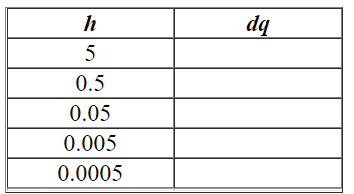
A)dq 13 8.5 8.05 8.005 8.0005
B)dq 40 4 0.4 0.000025 0.0005
C)dq 40 4 0.4 0.04 0.00000025
D)dq 200 2 0.02 0.0002 0.000002
E)dq 40 4 0.4 0.04 0.004
 , where h = 5, 0.5, 0.05, 0.005, and 0.0005. (It will be easier to do this if you first simplify the difference quotient ( dq )as much as possible.)
, where h = 5, 0.5, 0.05, 0.005, and 0.0005. (It will be easier to do this if you first simplify the difference quotient ( dq )as much as possible.)  Complete the table.
Complete the table. 
A)dq 13 8.5 8.05 8.005 8.0005
B)dq 40 4 0.4 0.000025 0.0005
C)dq 40 4 0.4 0.04 0.00000025
D)dq 200 2 0.02 0.0002 0.000002
E)dq 40 4 0.4 0.04 0.004

Unlock Deck
Unlock for access to all 140 flashcards in this deck.
Unlock Deck
k this deck
72
Calculate the limit algebraically. 


Unlock Deck
Unlock for access to all 140 flashcards in this deck.
Unlock Deck
k this deck
73
Calculate the average rate of change of the given function over the interval  .
. 
A)800
B)4,000
C)-50
D)-800
E)-200
 .
. 
A)800
B)4,000
C)-50
D)-800
E)-200

Unlock Deck
Unlock for access to all 140 flashcards in this deck.
Unlock Deck
k this deck
74
Calculate the average rate of change of the given function over the interval  .
. 
A)
B)
C)
D)
E)
 .
. 
A)

B)

C)

D)

E)


Unlock Deck
Unlock for access to all 140 flashcards in this deck.
Unlock Deck
k this deck
75
The chart shows the total annual support for the arts in the U.S. by federal, state, and local government in 1995-2003 as a function of time in years (  represents 1995)together with the regression line.
represents 1995)together with the regression line. 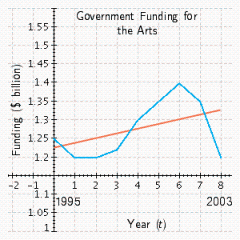 Over the period
Over the period  the average rate of change of government funding for the arts was _____ the rate predicted by the regression line.
the average rate of change of government funding for the arts was _____ the rate predicted by the regression line.
A)equal to
B)greater than
C)less than
 represents 1995)together with the regression line.
represents 1995)together with the regression line.  Over the period
Over the period  the average rate of change of government funding for the arts was _____ the rate predicted by the regression line.
the average rate of change of government funding for the arts was _____ the rate predicted by the regression line.A)equal to
B)greater than
C)less than

Unlock Deck
Unlock for access to all 140 flashcards in this deck.
Unlock Deck
k this deck
76
Calculate the average rate of change of the given function over the interval  .
. 
A)-$50,000
B)-$0
C)-$100,000
D)$50,000
E)$50
 .
. 
A)-$50,000
B)-$0
C)-$100,000
D)$50,000
E)$50

Unlock Deck
Unlock for access to all 140 flashcards in this deck.
Unlock Deck
k this deck
77
Calculate the average rate of change of the given function over the interval  .
. 
A)30.25
B)121
C)14
D)-121
E)56
 .
. 
A)30.25
B)121
C)14
D)-121
E)56

Unlock Deck
Unlock for access to all 140 flashcards in this deck.
Unlock Deck
k this deck
78
Calculate the average rate of change of the given function over the interval  .
. 
A)-44
B)40
C)-4
D)4
E)-40
 .
. 
A)-44
B)40
C)-4
D)4
E)-40

Unlock Deck
Unlock for access to all 140 flashcards in this deck.
Unlock Deck
k this deck
79
Calculate the average rate of change of the given function over the interval  .
. 
 .
. 

Unlock Deck
Unlock for access to all 140 flashcards in this deck.
Unlock Deck
k this deck
80
Calculate the average rate of change of the given function over the interval  .
. 
A)360
B)6
C)-36
D)-60
E)-6
 .
. 
A)360
B)6
C)-36
D)-60
E)-6

Unlock Deck
Unlock for access to all 140 flashcards in this deck.
Unlock Deck
k this deck














